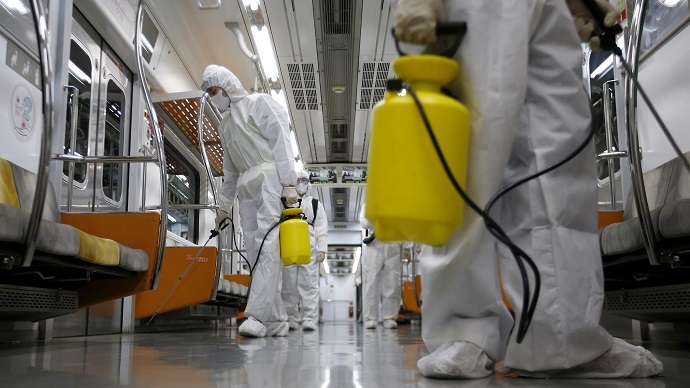‘Large & complex’ S.Korea MERS outbreak kills 14th patient, more cases expected

As South Korea reported its 14th fatality from an outbreak of Middle East Respiratory Syndrome (MERS), in addition to the 12 new cases, the World Health Organization warned the “large and complex” outbreak will cost more lives.
“Because the outbreak has been large and is complex, more cases should be anticipated,”Keiji Fukuda, who is leading a WHO team, told a news conference in Sejong, South Korea.
At the same time, Fukuda noted South Korean efforts to contain the outbreak, as all of the country’s cases have been linked to health facilities.
“At present, the mission has found no evidence to indicate there is an ongoing transmission in the community,” Fukuda said.
His assessment was based on a review conducted by his team and South Korean officials into the country’s response to the outbreak, the largest outside Saudi Arabia, where the virus was first discovered in 2012.
Releasing a new statement, the World Health Organization (WHO) said the outbreak in South Korea is similar to MERS outbreaks in health care facilities in the Middle East, but the situation in South Korea is rapidly evolving.
Since it was first diagnosed on May 20, the virus has infected 138 people in South Korea, killing 14 of them.
READ MORE: MERS virus spreading across Asia, South Korea fails to contain outbreak
The latest death was a 68-year-old woman who became sick at a hospital in Pyeongtaek City, the Health Ministry said on Saturday. The ministry added that all 14 fatal cases had pre-existing health conditions and were elderly, with many dying from hypertension and hypothyroidism.
The Health Ministry also announced 12 more people had contracted the virus, bringing the total number of confirmed cases to 138. Authorities traced the origin of infection of 133 people, 60 of whom contracted the disease at Samsung Medical Centre. Five others are still being investigated.
The new patients included an ambulance driver who fell ill after dealing with a 75-year-old infected woman who died three days later.
MERS comes from the same family of viruses as SARS. Although it is more deadly, it is not as contagious, but there is currently no cure or vaccine.












